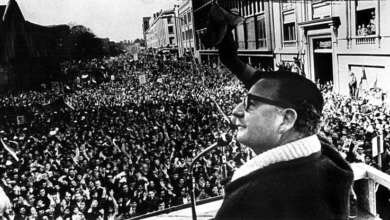Striking
Panamanian workers have recently won significant victories. The combined force
of construction and banana workers has forced the Panamanian government to
suspend its anti-worker, anti-union Law 30.
 Funeral procession for workers killed July 9 |
Passed by
Panama’s National Assembly on June 12, Law 30 limits the right to strike, union
membership and freedom of association. It also outlaws workers’ rights to
organize street protests during labor contract disputes, with the associated
criminal offense carrying a penalty of two years’ imprisonment.
Nicknamed
the “sausage law” for its far-reaching and largely undetermined contents, Law
30 was introduced in support of Law 14, which created new criminal offenses for
blocking roads by demonstrators.
In
response, Panamanian workers stood up in courageous defiance.
Some 4,000
banana plantation workers began striking July 2 after workers at the Bocas
Fruit Company had portions of their pay withheld by the company. As the
protests spread, nearly 2,000 independent banana growers joined the struggle.
On July 9,
the protest was confronted with violent police repression, ordered by
Panamanian President Ricardo Martinelli.
Martinelli,
a multimillionaire owner of the 35-store supermarket chain Super 99 and an
executive in Panama’s television and banking industry, took office on July 1
last year. He soon implemented his right-wing agenda, among other measures
announcing he would expel Cuba’s medical doctors, who have provided free
medical care for the Panamanian people.
In the
banana workers’ protest, the brutality of the police resulted in the deaths of
two workers, Antonio Smith and Fernán Castillo. More than 100 people were
wounded, and over 115 workers were arrested. The workers took four police
officers hostage with the intention of exchanging them for detained workers.
According
to union official Rafael Chavarría, the government attempted to downplay the
police violence. Chavarría also asserted that an additional four workers were
killed.
After 10
grueling days, the Panamanian government finally agreed to meet the workers’
demands, including the suspension of Law 30.
Meanwhile,
on the Panama Canal, a week-long strike led by construction workers ended July 13
following concessions by managers on working conditions. Construction workers,
employed by the international consortium Grupo Unidos por el Canal, had halted
work on a Panama Canal expansion project at the Gatun zone on the Panamanian
Atlantic coast.
Among the
workers’ demands were cooking and laundry facilities and an end to management
interference in their union, the National Union of Workers of Construction and
Similar Industries (SUNTRACS). Five strike leaders were arrested by national
police and canal security.
“More than
70 workers striking for salaries, working conditions, and against Ley 30 were
fired,” according to a communiqué by the banana workers’ union, FRENADESO.
“Police took the workers off the bus, handed them termination papers and gave
back the petitions that workers had given the ‘United for the Canal.’”
Police
also arrested officials and members of SUNTRACS in a raid of a union meeting at
a hotel in Panama City. In that meeting, a resolution passed that called for a
general strike. As of July 23, the union officials were still in jail.
In
solidarity with the strikers, 50 University of Panama students blocked one of
the main roads at the university. In response, the government ordered the
cancellation of classes.
The
bravery and solidarity of the Panamanian workers has yet again demonstrated
that when the working masses unite and fight for a common goal, anything can be
achieved.





